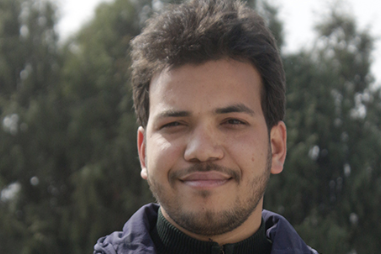NEWS
February 19, 2020

IN BRIEF
AL Nepal accountapreneur, Surendra Koirala, explains how the apps he’s developing as an ‘accountability entrepreneur’ are impacting civic engagement. Interview by Cheri-Leigh Erasmus Surendra Koirala (26) says he was 19-years-old when he started thinking about how to use technology – a topic he’s long been passionate about – to solve some of the worrying social problems in Nepal. A keen technology student and enthusiast, he knew there was a way that tech tools could be used to bridge damaging communication gaps between government officers and the public. “I feel strongly attached to my Nepali identity and the need to take [...]
SHARE
AL Nepal accountapreneur, Surendra Koirala, explains how the apps he’s developing as an ‘accountability entrepreneur’ are impacting civic engagement. Interview by Cheri-Leigh Erasmus
Surendra Koirala (26) says he was 19-years-old when he started thinking about how to use technology – a topic he’s long been passionate about – to solve some of the worrying social problems in Nepal. A keen technology student and enthusiast, he knew there was a way that tech tools could be used to bridge damaging communication gaps between government officers and the public. “I feel strongly attached to my Nepali identity and the need to take responsibility. I grew up in a remote area and had to walk for six hours if I wanted to catch a bus to Kathmandu. Seeing my family members struggle inspired me to solve local challenges,” Surendra says.
He adds that during the Maoist insurgency in the early 2000s in Nepal, he was almost abducted at the public school he attended. “I also saw a friend die during the conflict but I was able to flee. I got scholarships along the way to get to this point. Now, at age 26, I feel responsible to create change.”
As part of the AL Nepal Accountability Incubator, Surendra developed a cloud-based mobile app that facilitates direct communication between community members and elected representatives. It’s being trialled in a number of ways at different municipality test sites. Firstly, the system allows municipalities to manage and track inventories related to different projects and thereby streamline logistics. At another municipality, the app is used to display the various local government services on offer.
At Phakundebessi rural municipality, Surendra’s mobile app assists in the creation of online forms to register marriages, births and deaths which also has specific benefits in tracking migrant workers’ movements. He has also worked with the Nepalese government to build the USAID Data Quality Assessment Tool into a more accessible web-based tool. Additionally, he’s hoping to offer his innovative mobile app as an open source civic tech tool so that other social entrepreneurs can use it to build their own apps. His organization,which now employs 9 people, has already constructed an open source backend to house third-party data.
He believes the data applications are many. “For example, we have 4600 health facilities in Nepal. We should be reporting data on diagnoses in our Health Management Information System, but a lot of bad reporting – either over or under reporting – is hampering this process. This has a knock-on impact on policy making and budgeting,” Surendra explains.
He says his initiative is at a stage now where he needs to bring new leaders into the group to replicate some of the groundbreaking work already accomplished. He’s also keen to meet potential funders in the tech space. “It’s okay managing our cash flow when there are big projects that we’re working on, but not always when we only have smaller projects in the pipeline. I’ve found government to be one sustainable source of funding, so I’m working on getting more of that kind of work. … It’s also about finding champions, who are fierce leaders, to drive this change. One example is good mayors who are eager about tech,” Surendra says. Challenges aside, he has managed to double his revenue during the past two years off the back of a 90% growth rate.
“Nepal probably needs 1000 people like me in different sectors doing this work if we’re going to create real change,” he concludes. “You need more people to move the wheel. But I can create more pilot studies to drive change in the meantime. As an academic I can also package my work in a way that resonates with powerholders and the international community. I believe these efforts will lead to greater transparency.”
Can you support Surendra’s efforts to grow civic tech in Nepal? Become a friend or mentor for our Incubator – we’d love to have you involved. Mail us at [email protected].
Follow Surendra on Twitter @mespkoirala
*Erasmus is AL’s Learning Director
